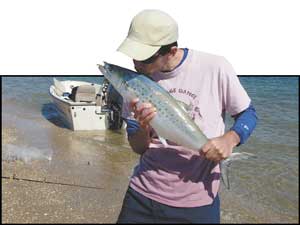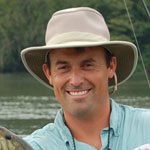
Spring is almost over, and summer officially will begin later this month.
The summer weather pattern is already here with 90-degree days and scattered thunderstorms in the forecast almost every day. Water temperatures are up, and whether anglers are fishing in salt or fresh water, the fish are biting across the board.
Crappie and bass are in postspawn, and shellcrackers, bluegills and catfish are spawning. Striped bass are leaving their spawning grounds and are preparing to enter into summer patterns as well. Flounder, trout, sheepshead, redfish, and croakers are invading the inlets and estuaries providing great fishing opportunities.
Offshore, the bite should be hot with good catches of wahoo, dolphin and yellowfin tuna. Inshore, the king mackerel, cobia, spadefish and Spanish mackerel are plentiful as well.
June is a great month for fishing anywhere in the region, but where should one go and when?
Even though fish everywhere should be biting relatively well, knowing where to go, what to use and when to go are key factors in determining success during a fishing trip.
Most of us aren’t fortunate enough to be able to go fishing several times per week. The only way to really figure out where to soak baits is to go fishing on a weekly basis and restrict target species to a choice few.
Most of my friends and acquaintances are avid fishermen, and they fish in North and South Carolina. Most of my business colleagues are avid outdoorsmen and love to fish. I make regular weekly contacts with my business colleagues, and they always have a fishing report, good or bad.
During any given day, at least one of my acquaintances is fishing or has just returned from fishing. I enjoy all of their fishing reports, but some are more accurate than others.
Many fishermen use the “story formula” to embellish trips on the water to make their adventures sound better than they actually were and to let listeners know how effecive they are as anglers.
Five fish actually may mean three fish and 10 pounds may mean 7 pounds. It’s probably a good idea — if you aren’t already doing this — to regard verbal fishing reports with a tinge of skepticism. How much you believe — or disbelieve — a report is, as it is with most people, a function of how much trust you place in the individual offering the report. A lot of the time, that’s got something to do with whether the reporter has a “dog in that hunt,” if you know what I mean.
Somebody with an economic incentive to induce someone else to go fishing at a certain place, out of a certain marina, with a certain captain or using a certain bait might best be listened to with a dash of wariness.
I get a lot of enjoyment and satisfaction out of a good fishing trip, just as we all do. I always get really excited when I have success.
Everybody who fishes knows anglers tend to have one successful day for every two or three unsuccessful days. It’s not a surprise one usually never hears about the poor days, only the good days — and always the great days.
With the advent of the Internet, many anglers daily visit outdoor fishing and hunting forums. One of the best South Carolina fishing forums is www.charlestonfishing.com, receiving close to 500 posts daily from more than 4,200 members. Its forums are broken into categories from Hilton Head to Myrtle Beach to the western part of the state.
Charter captains also post regularly.
If someone tells me the redfish are biting like mosquitoes at Alligator Creek or he tore up the bream in the Waccamaw River, it doesn’t always mean one can go there the next day and catch piles of fish.
It doesn’t really matter if they caught 20 fish or 10 fish because the odds are they didn’t lie about the entire story, but maybe just part of it. It really doesn’t matter how many they caught anyway.
What’s important is that someone caught some fish that particular day, with known tide condition, using a particular bait or lure, at a particular time, and in a certain habitat type.
A wise angler gathers all the information he can, filters it to help him find consistencies —and ultimately concentrations of fish when he’s finally on the water.
The primary component of Internet fishing reports isn’t really the numbers of fish a “poster” caught, but more important is the catch rate per hour, lure presentations and time and locations of the catches.
In addition, anglers have varying thresholds of personal success. But a fish seeker must keep in mind one fish caught by a particular angler may be the same as 25 fish caught by someone else.
Some anglers enjoy fishing get far more satisfaction from seeing a plan come together. I enjoy using a planned technique that results in catching fish much more than if I simply stumble across a lost fish that falls on my hook.
Fish can be finicky, but at other times they can be easily caught using a variety of lures and baits. All fish exhibit some sort of pattern, just as do fishing reports.
“Networking” should improve an angler’s fishing experiences. My definition is finding out as much information from as many sources as possible.
When I’m planning a fishing trip, I check many factors, including the weather, lunar charts, my personal log book, and gather as many fishing reports as I can. Many tackle shops and marinas have fairly current and sometimes very accurate reports. I like to call tackle shops and marinas and look for consistencies in those reports.
Another way to look at a fishing report is they create anticipation, get you excited about the trip and often offer a starting technique.
Obtaining a “semi-accurate” fishing report sometimes makes the difference, turning what might have been a poor trip into a great experience.




Be the first to comment